- Home
- Marie Rutkoski
The Winner's Curse Page 3
The Winner's Curse Read online
Page 3
The first two days had been blissful. He couldn’t remember the last time he had been allowed to be lazy. The bath had been amazingly hot, and the soap made him stare through the steam. The lather was richer than he’d had in years. It smelled like memories.
It left his skin feeling new, and though he’d held his head rigid while another Herrani slave cut his hair, and though he kept lifting his hand to sweep aside locks that were gone, on the second day he found that he didn’t mind so much. It gave him a clear view of his world.
On the third day, the steward came for him.
The slave, having no orders, had been wandering the grounds. The house was off-limits, but he was content to consider it from the outside. He counted its many windows and doors. He lay on the grass, letting its warm green static tickle his palms, glad that his hands weren’t too calloused to feel it. The yellow ocher of the villa walls glowed in the light, then faded. He listed in his mind which rooms of the house grew dark at which time of the day. He gazed up at orange trees. Sometimes, he slept.
The other slaves did their best to ignore him. At first, they shot him looks that varied from resentment to confusion to longing. He couldn’t bring himself to care. As soon as he’d been directed to the slaves’ quarters, housed in a building that looked almost exactly like the stables, he caught on to the pecking order of the general’s Herrani. He was last.
He ate his bread like the rest of them, and shrugged whenever asked why he hadn’t been assigned to a task. He answered direct questions. Mostly, though, he listened.
On the third day, he was making a mental map of the outbuildings: the slaves’ quarters, the stables, the barracks for the general’s private guard, the forge, small sheds for storage, a little cottage near the garden. The estate, particularly for being still part of the city, was large. The slave felt lucky that he had so many free hours to study it.
He was sitting on a gentle hill near the orchard, at a height that let him see the steward striding toward him from the villa long before the Valorian arrived. This pleased the slave. It confirmed what he had come to suspect: that General Trajan’s home would not be easy to defend if attacked in the right way. The estate had probably been given to the general because it was the largest and finest in the city, and ideal for maintaining a personal guard and horses, but the tree-covered slopes surrounding the house would have advantages for an unfriendly force. The slave wondered if the general truly didn’t see this. Then again, Valorians didn’t know what it was like to be attacked at home.
The slave stopped his thoughts. They threatened to plow up his past. He willed his mind to be frosted earth: hard and barren.
He focused on the sight of the steward huffing up the hill. The steward was one of the few Valorian servants, like the housekeeper, whose positions were too important to be assigned to Herrani. The slave assumed that the steward was well paid. He was certainly well dressed, in the gold-shot fabrics Valorians favored. The man’s thin yellow hair flew in the breeze. As he came closer, the slave heard him muttering in Valorian, and knew himself to be the target of the man’s irritation.
“You,” the steward said in heavily accented Herrani. “There you be, lazy good-for-nothing.”
The slave remembered the man’s name—Harman—but didn’t use it. He didn’t say anything, just let Harman vent his anger. It amused him to hear the man butcher his language. The steward’s accent was laughable, his grammar worse. His only skill was a rich vocabulary of insults.
“You come.” Harman jerked a hand to indicate that he should be followed.
The slave quickly realized he was being led to the forge.
Another Herrani was waiting outside. He recognized her, though he saw her only for meals and at night. Her name was Lirah, and she worked in the house. She was pretty; younger than him, probably too young to remember the war.
Harman began talking at her in Valorian. The slave tried to be patient as Lirah translated.
“Lady Kestrel can’t be bothered to place you, so I”—she blushed—“I mean, he”—she nodded at Harman—“has decided to set you to work. Usually the general’s guard see to their own weapon repair, and a Valorian blacksmith from the city is hired on a regular basis to forge new weapons.”
The slave nodded. There were good reasons why the Valorians trained few Herrani blacksmiths. One had only to look around the forge to understand. Anyone could see the heavy tools and guess the strength it would take to manipulate them.
“You will do this from now on,” Lirah continued, “so long as you prove to be competent.”
Harman took the silence that followed as an invitation to speak again. Lirah translated. “Today you will make horseshoes.”
“Horseshoes?” That was too easy.
Lirah gave him a sympathetic smile. When she spoke, it was in her own voice, not the stilted repeating of Harman’s. “It’s a test. You’re supposed to make as many as you can before sunset. Can you shoe a horse, too?”
“Yes.”
Lirah seemed to regret this answer on his behalf. She told the steward, who said, “That’s what he’ll be doing tomorrow, then. Every horse in the stable needs to be shod.” He snorted. “We’ll see how this animal gets along with the other ones.”
Before the war, Valorians had admired, even envied—yes, envied—the Herrani. After, it was as if the spell had been broken or a new one had been cast. The slave never could quite believe it. Somehow, “animal” had become possible. Somehow, the word named him. This was a discovery ten years old and yet remade every day. It should have been dulled by repetition. Instead, he was sore from its constant cut of surprise. He was sour with swallowed anger.
The pleasant, trained expression on Lirah’s face hadn’t faltered. She pointed to the coal bin, kindling, and heaps of raw and used iron. The steward set a box of matches on the anvil. Then they left.
The slave looked around the forge and debated whether he should pass the test or fail.
He sighed, and lit a fire.
* * *
His holiday was over. On his first day in the forge, the slave made more than fifty horseshoes—enough to appear dedicated and skilled, but not so much that he drew attention. The following day, he shod all the horses, even those whose shoes were new. The groom warned that some of the animals could be dangerous to handle, especially the general’s stallions, but the slave had no trouble. He made sure, however, that the task took the whole day. He liked listening to the horses’ low whickers and feeling their gentle, warm breath. Also, the stables were a decent place to hear news—or they would have been, if a soldier had come to exercise a horse.
Or if the girl had.
The slave was judged to be a good buy. Lady Kestrel had a fine eye, Harman said grudgingly, and the slave was given several weapons to repair, as well as orders for new ones.
Every dusk, when the slave walked across the grounds from the forge to his quarters, the villa blazed with light. It was curfew and bedtime for slaves, but the restless Valorians would stay up for a long while yet. They trained to get by on very little sleep, perhaps six hours a night—less, if necessary. It was one of the things that had helped them win the war.
The slave was the first to stretch out on his pallet. Each night, he tried to sift through the events of the day and glean useful information from them, but all he had experienced was hard work.
Weary, he shut his eyes. He wondered if those two days of idyll would turn out to have been a stroke of bad fortune. That time had let him forget who he was. It played tricks with his mind.
Sometimes, at the edge of sleep, he thought he heard music.
5
Usually, Kestrel thought of her house as an echoing place, one filled with mostly uninhabited, if lovely, rooms. The grounds, too, were quiet, the noises small: the scratch of a hoe in the garden, the faint thud of horse hooves from the paddock set far back from the house, the sigh of trees. Usually, Kestrel enjoyed how the space and quiet made her senses more awake.
L
ately, however, she had no peace at home. She sequestered herself with her music, but found that she played only difficult pieces, with notes clustered thickly together, her fingers chasing each other across the keys. Her sessions left her worn. The stiffness was minor and in localized spots—her wrists, the small of her back—but when she wasn’t playing she couldn’t ignore the twinges. Each morning she would swear to herself that she would go gently on the piano. Yet at dusk, after hours of feeling suffocated—no, as if she were hiding in her own home—she would again wrest something demanding from the music.
One afternoon, perhaps eight days after the auction, a note came from Jess. Kestrel eagerly opened it, glad for the distraction. Jess, in her typical swirly writing and short, eager sentences, asked why Kestrel was hiding from her. Would she please pay Jess a visit today? Kestrel’s advice on what to wear to Lady Faris’s picnic was needed. Jess added a postscript: a sentence in smaller writing, the letters bunched and hurried, signaling that she couldn’t resist dropping an obvious hint even at the same time she worried it would bother Kestrel: By the way, my brother has been asking about you.
Kestrel reached for her riding boots.
As she wound through the rooms of her suite, she caught a glimpse in a window of the thatched cottage near the garden.
Kestrel paused, the leather boots in her hand tapping against her thigh. The cottage was not so far away from the slaves’ quarters, which loomed at the border of the window’s view. She felt a tug of discomfort.
Of course she did. Kestrel glanced away from the slaves’ quarters and focused on Enai’s cottage. She hadn’t been to see her old nurse in several days. No wonder the view troubled her, when it showed the sweet little house Kestrel had had built for the woman who had raised her. Well, she would visit Enai on her way to the stables.
But by the time she had finished lacing her boots and gone downstairs, the steward had already discovered through the almost instantaneous gossip of the household that Kestrel was leaving. Harman ambushed her by the parlor door.
“Going for a ride, my lady?”
She pulled on a glove. “As you see.”
“No need to ask for an escort.” He snapped his fingers at an older Herrani man scrubbing the floor. “This one will do.”
Kestrel let out a slow breath. “I am riding to Jess’s house.”
“I’m sure he can ride,” Harman said, though they both knew full well this wasn’t likely. Riding was not taught to slaves. Either they had the skill from before the war or never would. “If not,” Harman said, “you can take the carriage together. The general would gladly spare the use of two horses for the carriage to make sure you’re properly escorted.”
Kestrel nodded, just barely. She turned to leave.
“My lady, one more thing…”
Kestrel knew what that one more thing would be, but couldn’t stop him, for to do so would have been to admit that she knew and wished she didn’t.
“A week has passed since your purchase of that young slave,” the steward said. “You’ve given no instructions for his employment.”
“I forgot,” Kestrel lied.
“Of course. You have more important things to deal with. Still, I was certain you had no intention of him lazing around, doing nothing, so I assigned him to the forge and to serve as a farrier for the horses. He has done well. My compliments, Lady Kestrel. You are an excellent judge of the Herrani market.”
She looked at him.
Defensively, he said, “I only put him to work in the forge because he was suited to it.”
She faced the door. When she opened it, she’d see nothing but trees. There was no view from this part of the house that could unsettle her. “You made the right choice,” she said. “Do with him as you see fit.”
Kestrel stepped outside, her escort wordlessly following.
She didn’t stop by the cottage after all. She walked straight to the stables. The old Herrani groom was there, as always. There was no one else. Kestrel went to stroke the nose of her horse, a big-boned animal bred for war and chosen for her by the general.
When she heard footsteps behind her, the sound of someone new entering the stables, she turned. Two soldiers walked up to the groom and ordered that their horses be saddled. Kestrel looked beyond them and saw the Herrani slave Harman had selected as her escort waiting patiently by the door.
She had no wish to waste time finding out if he could ride. She wanted to leave now. When they reached Jess’s house she would send him to the kitchens so she wouldn’t have to see him until the return home.
“Ready my carriage first,” she told the groom, giving the soldiers a look that dared them to argue. They didn’t, but were visibly irritated. She didn’t care. She had to leave, the sooner the better.
* * *
“This one?”
Kestrel looked up from where she sat on a low divan strewn with dresses.
“Kestrel,” said Jess, “pay attention.”
Kestrel blinked. A black-haired girl, Jess’s slave, was tying a sash around her mistress’s waist, drawing in the flowery skirts so that they belled at the hips. Kestrel said to Jess, “Didn’t you already try on that dress?”
“No.” Jess snatched the sash out of the slave’s hands and threw it onto the silken pile next to Kestrel. “You hate it, don’t you?”
“No,” said Kestrel, but Jess was already struggling out of the dress while her slave anxiously tried to undo its buttons before they popped. Pink skirts landed on Kestrel’s lap.
“What are you going to wear?” Jess stood there in her slip. “Lady Faris’s picnic is the event of the summer season. You can’t look less than stunning.”
“That will pose no problem for Kestrel,” said a trim, stylishly dressed man lounging against the jamb of the door he had opened without their hearing. Jess’s brother smiled at Kestrel.
Kestrel smiled back at Ronan, but in a crooked way that showed that she knew his exaggerated brand of flirtation was all the rage among young Valorian men these days and not to be taken seriously. She also knew that this—this dress-up session, Ronan’s safe compliments—was what she had come for, in the hopes her mind would become too cluttered to think for itself.
He crossed the room, pushed dresses off the divan and onto the floor, and sat next to Kestrel. The black-haired slave, looking besieged, bent to collect the delicate fabrics.
Kestrel felt a sudden impulse to say something sharp, but wasn’t sure to whom. Then the strains of music drifting in from the corridor saved her from embarrassing everyone in the room, including herself.
“The Senest nocturne,” she said, recognizing the piece.
Ronan tilted his blond head against the ornately carved wood that edged the divan. He slunk against its soft back, stretching out his booted legs, and gazed up at Kestrel. “I told Olen to play,” he said, referring to their Herrani musician. “I know it’s one of your favorites.”
Kestrel listened. The notes were careful, but oddly paced. She tensed at the arrival of a tricky passage and wasn’t surprised to hear it flubbed.
“I could play,” she offered.
Brother and sister exchanged a look. “Another time,” Ronan said. “Our parents are home.”
“They won’t notice.”
“You’re too talented.” He rested a hand on hers. “They will.”
Kestrel slipped her hand away. Unbothered, Ronan reached for a stray ribbon between them and toyed with the strip of fabric, weaving it around his pale fingers. “So,” he said, “what’s this I hear about your extravagant purchase at the auction? Everyone’s talking about it.”
“Or they were,” said Jess, “until a duel between the Trenex cousins.”
“To the death?” said Kestrel. Duels had been banned by the emperor, but they were too entrenched a custom to be easily rooted out. They were usually overlooked by the authorities so long as there was no loss of life, and even then the only punishment was a levied fine.
“No,” said Jess excitedly,
“but blood was drawn.”
“Tell me everything.”
Jess inhaled, ready to spill her gossip, but Ronan raised one ribboned finger and pointed it at Kestrel. “You,” he said, “are changing the subject. Go on. Explain the mystery that cost you fifty keystones.”
“There is no mystery.” She decided to give a sensible reason that had nothing to do with why she had bought him.
And why had she?
Pity, perhaps. That strange sense of affinity.
Or had it been nothing more than simple, shameful possession?
“The slave is a blacksmith,” Kestrel said. “My father keeps a personal guard. We needed someone to maintain weapons.”
“That’s what the auctioneer advertised,” Jess said, stepping into another dress. “The slave was a perfect fit for Kestrel’s household.”
Ronan raised his brows. “To the tune of fifty keystones?”
“What do I care?” Kestrel wanted to end this conversation. “I am wealthy enough.” She touched Ronan’s sleeve. “And how much”—she rubbed the silk between her fingers—“did this cost?”
Ronan, whose deftly embroidered shirt was easily the same price the slave had been, allowed that a point had been made.
“He will last longer than this shirt.” Kestrel let go of the cloth. “I’d say I got a bargain.”
“True enough,” said Ronan, looking disappointed, though whether because she had pulled away or because her mystery had turned out to be not so mysterious, Kestrel couldn’t say. She preferred the latter. She wanted to forget the slave, and for everyone else to do the same.
“Speaking of clothes,” said Jess, “we still haven’t settled on what I am to wear.”
“What about this?” Kestrel stood, glad for an excuse to leave the divan, and crossed the dressing room to lift out a dress whose sleeve peeked from an open wardrobe. She held it, gazing at the extremely light shade of lilac. She ran a hand under the sleeve and let it fall, admiring its shimmer. It was silvery. “The fabric is lovely.”
“Kestrel, are you mad?” Jess’s eyes were wide. Ronan laughed, and Kestrel realized it was because he thought she had made a joke.

 The Celestial Globe
The Celestial Globe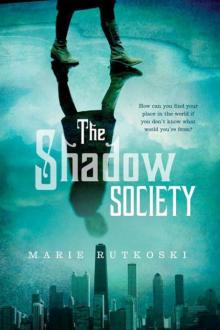 The Shadow Society
The Shadow Society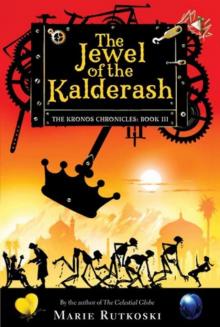 The Jewel of the Kalderash
The Jewel of the Kalderash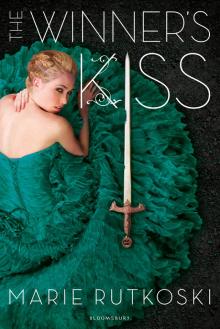 The Winner's Kiss
The Winner's Kiss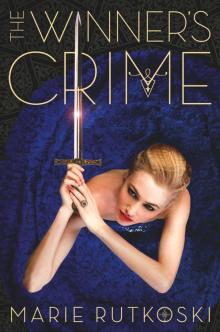 The Winner's Crime
The Winner's Crime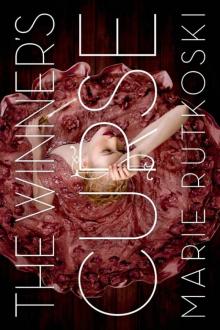 The Winner's Curse
The Winner's Curse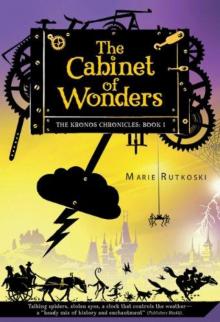 The Cabinet of Wonders
The Cabinet of Wonders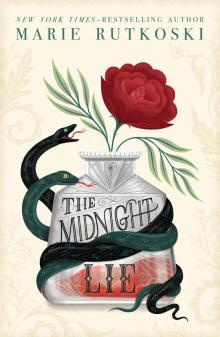 The Midnight Lie
The Midnight Lie The Hollow Heart
The Hollow Heart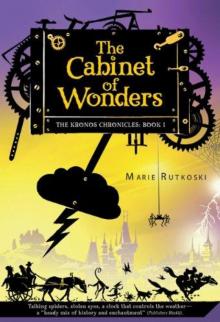 The Cabinet of Wonders: The Kronos Chronicles: Book I
The Cabinet of Wonders: The Kronos Chronicles: Book I The Celestial Globe: The Kronos Chronicles: Book II
The Celestial Globe: The Kronos Chronicles: Book II